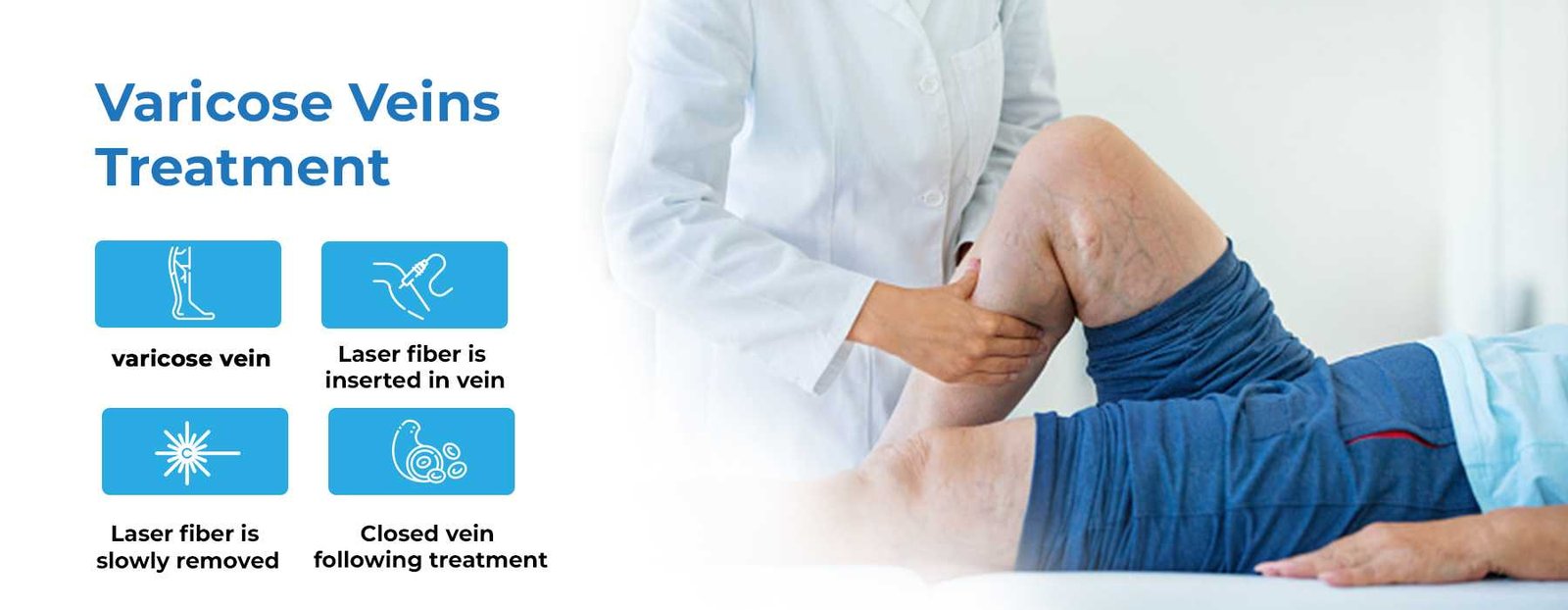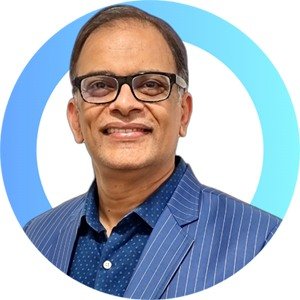Varicose Veins Laser Treatment
Ask the Experts

Varicose Veins Treatment in Hyderabad
Diagnosis & Treatment Procedure of Varicose Veins
Varicose veins affect nearly 30% of Indians, causing symptoms like leg swelling, pain, inflammation, discoloration, and nerve discomfort. If left untreated, they can lead to severe complications such as venous ulcers or even cancer. At Maven Medical Center, Hyderabad’s leading facility for varicose veins treatment, we offer state-of-the-art, non-surgical solutions with the highest success rates.
By the advancements in medical science and technology, varicose veins can now be treated non-surgically using a laser! Painless and less invasive, the EVLT non-surgical laser treatment of varicose veins.
What are Varicose Veins?
Varicose veins are enlarged, twisted, and dilated veins, primarily in the legs, caused by weakened valves that disrupt blood flow. They not only cause discomfort but can also impact your quality of life.
What Happens if Varicose Veins are Left Untreated?
If left untreated, varicose veins can worsen, leading to venous ulcers, which are difficult to treat. Long-standing ulcers may even develop into cancer.
State Of Art Top Class Medical Facilities to Remove Varicose Veins
- Varicose vein endovenous LASER ablation
- Microwave Ablation
- Treatment is quick and simple.
- No scars or stitches
For Appointment: Enquire Now
Diagnosis of Varicose Veins
Our diagnostic process includes:
-
Medical History Review: Understanding symptoms and risk factors.
-
Physical Examination: Assessing visible veins and leg condition.
-
Diagnostic Tests: Doppler ultrasound or venography to evaluate vein health.
How Varicose Veins Appear And Developed & Impact
Before & After Treatment : Click Here

Why should go for treatment?
Health complications of ignoring varicosities
Benefits of Early Treatment
-
Prevents complications like ulcers and skin discoloration.
-
Reduces pain and swelling.
-
Improves blood circulation and overall leg health.
-
Enhances cosmetic appearance.
Treatment Options for Varicose Veins
We specialize in modern, non-surgical treatments that ensure quick recovery and lasting results:
- Endovenous laser therapy (EVLT)
- RFA
- MWA (Microwave Ablation)
Advantages of Laser / Microwave/ RFA Treatments
- No cuts
- No scars
- No pain
- Early recovery
- Daycare procedure
- No hospital admission
- Same-day discharge
Endovenous Laser Treatment (EVLT or EVLA) Procedure
Why is EVLT ?
-
A safe, minimally invasive procedure.
-
No general anesthesia required.
-
High success rate with rapid recovery.
-
Walk-in, walk-out daycare procedure.
Microwave Ablation for Varicose Veins
You might be wondering, why microwave ablation when there are other treatments like laser and radio frequency available, right? And you feel like How Does It Works?
It operates by using heat like other laser ablation procedures to permanently destroy refluxing veins. However, temperatures in Microwave ablation ranges from 80-100°C only compared to EVLA where temperatures are up to about 800°C ,and RFA where it is around 120°C which leads to less chances of vein wall perforation and reduced ecchymosis. Besides, comparative studies have indicated that recanalization rates after Microwave ablation is low as compared to both EVLT and RFA
Maven Medical Center is the first center in the whole of the country to introduce the ECO 100E2 Microwave Ablation Machine, which can be used for both Microwave Ablation of Varicose Veins and Tumor Ablation of Thyroid, Breast, Liver, Lung, Kidney and bone etc. If you are suffering from any one of these conditions and are looking for a non-surgical treatment option
Radiofrequency Ablation (RFA) for Varicose veins
During the procedure, a small probe is inserted into the vein through a small incision in the skin. The probe emits radiofrequency energy, which heats the walls of the vein and causes them to collapse. This closes the vein and redirects the blood flow to other healthy veins.
Common Signs and symptoms of Varicose veins
- Bumpy, swollen twisted veins raising over the skin surface of legs.
- Aching, heavy legs (often worse at night and after exercise).
- Ankle swelling
- A brownish-blue shiny skin
- Redness, dryness, and itchiness of areas of skin.
- Cramps Minor injuries
- Non healing venous ulcers over legs mostly on ankles.
*** Maven Medical Center has Latest Treatment Technologies like Endovenous Laser Ablation therapy (EVLT), Radio Frequency Ablation (RFA), Sclerotherapy, Microwave Abalation (MWA), Glue Therapy (Glue). ***
Make an Appointment at Maven Medical Center
-
Advanced Technology: Equipped with cutting-edge tools like Endovenous Laser Therapy (EVLT), Microwave Ablation (MWA), and Radiofrequency Ablation (RFA).
-
Non-Surgical Treatments: Painless, minimally invasive procedures with no scars, stitches, or hospital admission.
-
Expert Care: Experienced doctors and personalized treatment plans.
-
Transparent Pricing: No hidden costs, with insurance processing support.
-
First in India: Introduced the ECO 100E2 Microwave Ablation Machine for varicose veins and tumor treatment.
-
Comprehensive Care: From diagnosis to recovery, we guide you at every step.
-
Patient-Centric Approach: Transparent pricing, insurance support, and personalized care.
Take the first step towards healthier legs and improved comfort by consulting the experts at Maven Medical Center. Your journey to recovery begins here!
Case study:
Treatment of soft tissue with laser and microwave ablation techniques
introduction
Intravenous laser ablation (EVLA) and microwave ablation (MWA) are successfully used to treat nerve pain and cosmetic concerns. In this case study, Drs. Rajesh Kumar Enagala and Dr. Balaji Patel kola highlight the treatment for both patients, with a success rate of 98%.
Patient 1: Vijaya Lakshmi (45 years)
-
Symptoms: Pain and swelling in legs.
-
Diagnosis: Venous reflux in the great saphenous vein.
-
Treatment: Laser ablation.
-
Outcome: 98% success rate with complete relief.
Patient 2: Sudhakar (50 years)
-
Symptoms: Leg ulcers and muscle dysfunction.
-
Diagnosis: Chronic venous insufficiency.
-
Treatment: Microwave ablation.
-
Outcome: Significant improvement with no recurrence.
Post-Treatment Care
-
Compression Stockings: Worn for 48 hours post-procedure to reduce swelling.
-
Medications: NSAIDs, vasodilators, or anticoagulants as prescribed.
-
Follow-Up Visits: Regular check-ups to monitor recovery.
Medication for Varicose veins
Medication is recommended for mild varicose veins
- Compression stockings: these help to reduce swelling and pain by applying pressure to the legs. They can be bought over the counter or prescribed by a Veins doctor.
- Nonsteroidal anti-inflammatory drugs (NSAIDs): These medications, such as ibuprofen and naproxen, can help to reduce swelling and pain in the legs.
- Vasodilators: These medications, such as calcium channel blockers and nitrates, can help to relax the muscles in the blood vessels and improve blood flow.
- Anticoagulants: These medications, such as warfarin and heparin, can help to prevent blood clots from forming in the veins.
Our Varicose Veins Laser Treatment Specialist Doctors
Varicose Veins Laser Treatment FAQ's
Venous reflux is a medical condition and is the most common cause of varicose veins. When the valves inside your veins don’t work properly, they allow blood to flow backwards and pool in your veins. This is called venous reflux. Obesity, pregnancy, and long periods of sitting or standing are also causes of varicose veins.
If varicose veins are not treated, they will probably get worse over time. The valves inside the veins may be damaged and the veins will get more twisted and enlarged. The skin over the veins may turn dark and ulcers (sores) may develop
There are several types of varicose veins removal procedures. The most common and effective is surgical stripping, which is performed under general anesthesia. This involves making tiny cuts in the skin and removing the problem vein through the cuts.
There is no sure way to prevent varicose veins from developing or worsening. However, you can take some steps to lower your risk of getting them: 1. Elevate your legs when you can. 2. Wear comfortable shoes, preferably with low heels. 3. Stay physically active to encourage good blood flow in your legs. 4. Wear relaxed clothing. 5. Avoid anything that constricts or squeezes the legs, such as belts, garters, and socks with tightbands. 6. Avoid sitting or standing in one position for long periods of time
There are no official stages of varicose veins, however they are sometimes categorized by class. Class 1 varicose veins are small with few symptoms. Class 2 veins are larger, painful or with skin changes. Class 3 veins are extremely large and can cause severe symptoms. Class 4 veins are the largest and can ulcerate or bleed.
There are a variety of reasons why spider veins may develop, including: Though the reason spider veins develop is unknown, they are often linked to heredity, pregnancy, weight gain and standing or sitting for prolonged periods. If you notice spider veins suddenly appearing, be sure to check with your doctor to ensure there isn’t an underlying medical condition causing them. 1. Exercise and hot weather make your veins more prominent. 2. Ageing, being overweight. 3. Genes. 4. Diseases affecting the veins are more serious.
A high fiber diet may help reduce the risk of varicose veins. Fiber is found in whole grains, beans, most fruits and vegetables, Foods high in flavonoids are citrus fruits, salmon, avocados and nuts. berries, dark chocolate and green tea. Fiber keeps the bowels open and helps prevent constipation, a factor in varicose veins.
Specialist doctors for varicose veins treatment in Hyderabad are: Dr. Rajesh Kumar Enagala and Dr. Balaji Patel. Kola
Treatments for varicose veins will depend on the individual case, include vein ligation and stripping, laser treatment, or radiofrequency method. Sclerotherapy or laser therapy and surgery.
Maven Medical Center for Advanced Laser Varicose Veins and Spider Veins Treatment at an affordable cost by varicose vascular Specialist Doctors.
The cost of Varicose Veins treatment in Hyderabad varies from stage of disease and treatment doctor propose which ranges from Rs. 30,000 to 2,00,000.
Ask the Experts
Working Time
- Mon-Sat 09:00 - 19:00
Contact Info
-
Phone: +91 8121 200 400
+91 8121 800 400




